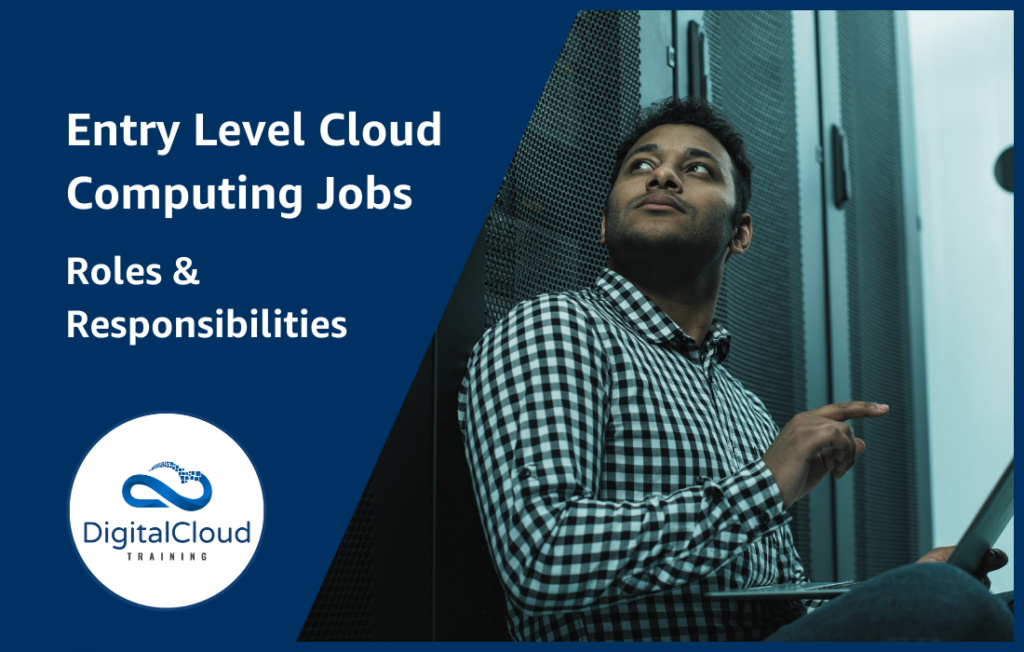Entry Level Cloud Computing Jobs – Roles and Responsibilities
Please use the menu below to navigate the article sections:
- What Do You Need to Work in Cloud Computing?
- Entry Level Cloud Computing Jobs – Roles and Responsibilities
- Cloud Developer
- Cloud Engineer
- Cloud Security Professional
- Cloud Sales Executive
- Cloud Support Engineer
- Systems Administrator
- Technical Account Manager (TAM)
- Data Analysts
- Digital Skills Officer
- Cloud Consultant
- Where to Find Cloud Computing Jobs
- Conclusion
- Get Started Today
- Further Reading

If you’re an individual interested in pursuing a career as a cloud computing professional – this article will inform you about the various entry level cloud computing jobs, as well as the scope of responsibilities.
Cloud computing is a hot topic these days. Many organizations are looking for motivated cloud enthusiasts to fill their vacancies – not only in the IT department but also in accounting, marketing, and more. Cloud computing has changed how we work, learn and play. Today’s businesses need professionals with the knowledge of what it takes to be successful in this new environment – enter cloud computing professionals!
Watch Neal’s video on ‘Entry Level Cloud Jobs’
Click the image above to watch Neal’s video on our YouTube channel
What Do You Need to Work in Cloud Computing?
If you want to work in the highly lucrative cloud computing sphere, follow these steps:
- Take Cloud Computing Courses and Get Certified: You can take online training courses to gain and deepen your knowledge on cloud computing technology and infrastructure. Get familiar with products like Microsoft Azure, Amazon AWS, and Google Cloud.
- Gain Sound Knowledge of Basic Cloud Concepts: This is an important step you shouldn’t overlook. A beginner in cloud computing must have a sound knowledge of the basics such as virtualization, storage, and networking. Check out this beginner friendly course to get you started.
- Build your Network: Make sure you contact potential employers directly when looking for entry-level jobs in this space because it is one industry where employees are always needed! Once hired, make connections within the company so you get noticed early on about opportunities – whether it’s a promotion later on or gaining new skills.
- Gain hands-on experience: Whether it’s a paid job, a volunteer project or a secure lab environment – gaining experience in areas such as cloud computing architecture and design is key. Find opportunities to work on projects that involve designing and deploying systems for public/private/hybrid cloud.
- Familiarize Yourself With Current Trends: Knowing the latest trends in cloud computing will help you make a better career move. This area is evolving at a fast pace – gaining knowledge of new technologies and its usage within different organizations will always be to your advantage.
- Take the Leap: Don’t let fear hold you back from achieving your career goals and aspirations! If you believe in yourself and have what it takes to make this work, go for it! This is one field that will always be there because of how technology has changed our lives drastically over the years. The world needs cloud computing professionals now more than ever. Therefore, if you’re ready, then take that leap into growing as an individual while also helping companies grow their business by using advanced tools like infrastructure-as-a-service (IaaS), platform-as-a-service (PaaS), and more.
You can choose to build multi-platform expertise or specialize in the services of a specific cloud platform. For example, you can work on Amazon Web Services (AWS) or Microsoft Azure exclusively and make yourself a cloud computing expert in no time! Regardless of what you choose, following these steps will help you land your dream job in cloud computing.
Entry Level Cloud Computing Jobs – Roles and Responsibilities
If your dream is to work in cloud computing, there are various entry level cloud computing jobs that provide great scope for growth. Let’s analyze each one of them:
Cloud Administrator
This is a hands-on role that involves managing cloud resources such as networks, storage, and virtual machines. These professionals are responsible for maintaining uptime of the systems they’re responsible for.
A cloud administrator must have excellent systems administration and network skills, as well as the ability to handle day-to-day issues that arise in a cloud computing environment. Additionally, knowledge of virtualization technologies such as hypervisors and VLANs is also required to carry out this role effectively.
The main role of a cloud administrator is to work with the IT department to deploy, configure, and monitor compute, storage and networking services running in the cloud. An ideal cloud administrator must have the ability to work with various operating systems because sometimes they are asked to manage devices that aren’t part of their own infrastructure or platform. This means working across many different platforms.
Certifications for entry-level cloud administrators should be kept up to date so you can prove your abilities when applying for job openings.
There are various certifications that aspiring cloud administrators should consider, including:
- AWS Certified SysOps Administrators
- Cloud Credential Council – Professional Cloud Administrator Certification
- Google Apps Certified Administrator
- Microsoft Certified Solutions Expert
- VMware Certified Cloud Professional
- Certified OpenStack Administrator
You can choose to do one certification, but the more you have the better.
Cloud Developer
This is a role that focuses on the development of cloud computing solutions. A cloud developer will work with other members in the IT department to design, create, and maintain applications that are used by end-users for specific purposes.
A good understanding of programming languages is required when you’re considering this career path. It’s also important to have a firm grasp of databases because most companies use their own database management systems within virtual machines. Cloud developers must be proficient at coding software programs/apps that can function well in multi-tenant environments where several clients share infrastructure resources simultaneously!
The main responsibilities of a cloud developer include:
- Creation and maintenance of various applications using different types of programming languages like Java, Python, and more. These professionals need the ability to integrate data sources and identify the kinds of problems that can arise due to incompatibility or security concerns.
- Designing and configuring virtual machines as per business needs, including setting up networking resources such as load balancers for scalability purposes. Cloud developers generally work with DevOps professionals to debug code/programs if issues are encountered during deployment phases.
- Management of cloud infrastructure resources like networks, storage, compute services etc., in collaborative efforts with other team members from various departments across a company.
- Testing of new applications before they are made available to clients/end users.
- Maintaining documentation that outlines the architecture and components used for various projects. This is important because most businesses change their infrastructure often, so it’s essential to always have an updated document with detailed information on what solution is currently implemented.
Most companies look for certified cloud developers who can prove their ability in this area. Cloud developer certifications include:
- AWS Certified Developer – Associate or Professional
- Microsoft Certified Azure Developer Associate
- Google Certified Professional Cloud Developer
- Salesforce Certified Platform Developer
Cloud Engineer
A cloud Engineer’s primary responsibilities are to design, implement, and maintain cloud computing solutions for clients/organizations. They must have the ability to communicate with both technical and non-technical team members so they can understand business needs first hand.
At this level, you must be well versed in other areas like networking, storage systems, and virtualization. Cloud engineers also need to be able to take full advantage of different types of infrastructure services that are provided by companies in the cloud computing domain.
You must have knowledge and skills in using programmability interfaces that can be used to automate tasks, troubleshoot issues related to infrastructure resources, and enhance the overall performance of network devices. Additionally, you must be able to use programming languages such as Python, Ruby, and others to develop APIs that can easily integrate with cloud computing solutions.
Other main responsibilities of a cloud engineer include:
- Designing virtual networks/infrastructure resources for clients using software like Cisco CloudCenter or OpenStack. You must be able to design networking devices used in different types of infrastructure environments. For example, you may need to use Juniper Contrail Networking if your client is looking at Software-Defined Networks.
- Deployment and configuration of hardware appliances as per business needs. These professionals usually work closely with vendors who supply these products so they can understand various features/functions available before purchase decisions are made by their clients! This applies primarily to companies where the IT department has decided to go for private cloud infrastructure.
- Development of automation scripts that can be used to manage various tasks including provisioning, configuration change management, and more, related to physical/virtual network devices and compute resources. You may use tools like Puppet or Chef in this case.
- Designing disaster recovery plans by understanding the performance requirements of clients’ business needs; thus helping them achieve their goals more easily. Cloud engineers must have strong problem-solving skills when issues arise during deployment phases. They need to work with other team members from different IT departments across an organization’s structure too.
There are different sub-roles of cloud engineer, including:
- Software Engineer: The main role of a software engineer is to create and manage the software that is used in a cloud infrastructure. Also, this professional fixes bugs and errors related to the software.
- DevOps Engineer: This role is a combination of cloud engineer and software developers. A DevOps Engineer’s responsibilities include deploying new applications, updating the existing ones, as well as troubleshooting errors.
- Security Engineer: This professional offers expertise to protect the integrity, confidentiality, and availability of data and resources in a cloud computing environment.
- QA Engineer: Responsibilities of a QA Engineer include testing the performance and functionality aspects for software applications used in cloud computing.
- Full-Stack Engineer: The main role of this expert is to write code that can be used to develop various components of a cloud computing environment. A full-stack engineer is familiar with front-end and back-end design principles, thus allowing them to work on all phases of the software development lifecycle.
- Data Engineer: This individual manages and organizes data at scale in a cloud computing environment.
Some of the certifications options in this role include:
- Google Cloud Certified Associate Cloud Engineer
- AWS Certified DevOps Engineer – Professional
- Cisco Certified Network Professional – Cloud
Cloud Security Professional
This role mainly involves the management of cloud security. As a professional, you will need to know how to monitor, detect and respond in case of an attack. You must be able to manage your clients’ security requirements by understanding the industry best practices (with respect to cloud computing) along with their compliance needs.
Becoming a cloud security professional can be a very rewarding career choice.
There are several certification options you can choose from, including:
- AWS Certified Security Specialty
- The Cloud Security Engineer Professional Certificate offered by Google Cloud
- Certificate of Cloud Security Knowledge (CCSK) by the Cloud Security Alliance (CSA)
- Certified Cloud Security Professional (CCSP) by ISC2
Cloud Sales Executive
This is a specialized role that involves selling cloud computing services to clients. You will need to understand the business needs of your potential customers and offer them products/services which best suit their requirements in an efficient manner.
A Cloud Sales Executive must have solid communication skills so they can clearly explain how the capabilities offered by different cloud providers add value for businesses. This professional should also be able to negotiate with vendors on behalf of their clients, thus closing deals quickly and efficiently.
Skills required for this role include:
- Sales, Marketing, Business Development & Relationship Management
- Client Interaction Skills
- Strong Analytical Thinking Ability and Problem Solving Techniques
- Strong knowledge of different cloud computing services
Cloud Support Engineer
This role involves providing technical assistance to cloud computing users in case they run into any issues. You will need to know all about different types of clients, their requirements, and how the products/services offered by your organization can help them solve their problems.
You should also be able to communicate with various teams within an enterprise (other than just the IT department) without requiring too much guidance or instruction.
Technical skills required for this role include knowledge on:
- Networking & Security
- Virtualization Technologies
- System Administration Tools
- Operating Systems
- Databases
- Application Development Tools
Since this role involves interacting with people, having strong social and communication skills is a must!
Systems Administrator
This is basically a junior version of DevOps Engineer. The Systems Administrators are responsible for managing and maintaining cloud computing systems, including networks and operating systems used in such environments to provide support (24/365) during emergencies and ensure that all applications run smoothly.
This role is a great way to get started with your career in cloud computing. You will need to have solid troubleshooting skills, excellent communication, and problem-solving abilities since you’ll be working closely with clients/different teams within an enterprise on a daily basis.
Some of the certifications options include:
- Microsoft Certified: Azure Administrator Associate
- Red Hat Certified System Administrator
- CompTIA Server+
- Red Hat Certified Engineer
- CompTIA Security+
- Linux Professional Institute LPIC-1 Linux Administrator
- Cisco Certified Network Associate
- VMware Certified Professional – Data Center Virtualization
Technical Account Manager (TAM)
The roles of a TAM are similar to those of a Cloud Support Engineer, but they tend to involve more complex issues and require a greater level of expertise. For instance, your support tickets may include scenarios such as:
- Fixing security loopholes in the cloud environment
- Troubleshooting problems related to storage or networking within virtual machines (VMs) on demand
- Managing new customer accounts/activity logs/backups for an existing client
- Working closely with vendors & manufacturers while ensuring that their products work well with your organization’s specific requirements
This role requires strong communication skills and the ability to work independently. A TAM should also have a good understanding of cloud computing platforms such as:
- Microsoft Azure
- Amazon Web Services (AWS)
- Google Cloud Platform
- VMware vSphere/vCenter
Strong technical knowledge of different technologies is expected, including but not limited to:
- Networking & Security
- Virtualization Technologies
- System Administration Tools
- Databases
- Application Development Tools
- Operating Systems
- Database Management Systems (DBMSs)
- Programming Languages
- Internet Protocol Suite(TCP/IP suite)
- Other standards that are specific to your industry or company’s needs!
Some certification options for TAM include, but are not limited to:
- Google Data Analytics Professional Certificate
- Professional Certified Marketer (PCM)
- Management Consultant Professional (MCP)
- IT Information Library Foundations Certification (ITIL)
- Certified Professional – Human Resource (IPMA-CP)
- Certified Information Technology Professional (CITP)
Data Analysts
This role is mainly focused on gathering information and analyzing data. It requires a strong understanding of information security and how different data is protected. To be a data analyst, you need to have skills in SQL and creating visualizations, using Business Intelligence (BI) tools, and using programming languages/statistical tools.
Other skills you need include:
- Microsoft Excel
- Data optimization
- Decision making
- Statistical analysis
- Regression analysis
- Data engineering
- Building data sets
- Machine learning algorithms
Some of the certification options for this role include:
- AWS Certified Data Analytics
- CompTIA Data+
- Microsoft Certified: Data Analyst Associate
- Cloudera Certified Associate Data Analyst
- Certified Analytics Professional (CAP)
Digital Skills Officer
This role is focused on digital skills training – this includes topics in digital literacy, technology operations, and entrepreneurship. You will be required to create course content for employees who are looking to develop their existing knowledge or acquire new ones.
You should have good communication skills along with the ability to work independently as well as part of a team. Knowledge about cloud computing platforms and various technologies are also an advantage.
While there are no specific courses geared towards this role, below are some courses you should consider:
- Adaptable Cloud Education Leader Certification offered by L-Cloud
- Take the Cloud Trainer Course offered by the ROI Training Institute
- Google Cloud Platform Authorized Trainer Certification by Google or an affiliated organization
Cloud Consultant
A cloud consultant offers guidance to companies looking to venture into the cloud. You will analyze a company’s technology infrastructure and provide suggestions on how to improve it. This may include migrating from an existing data center or building a new one, setting up private servers, and more.
In addition to strong communication skills, you should also have good technical knowledge of different technologies such as:
- Cloud Management Platforms
- Virtualization Technologies
- Networking & Security
- Databases
- Operating Systems
- Programming Languages
- And other standards that are specific to your industry/company’s needs
In most cases, you will need a bachelor’s degree in IT or computer science to take up this role. Since this position requires managerial skills, having an MBA is usually preferred.
Where to Find Cloud Computing Jobs
When it comes to looking for entry level cloud computing jobs, there are many platforms that you can visit, including job boards, employers’ websites, and cloud computing communities and forums. Let’s take a closer look at each of these options.
Job Boards
Job boards are a great option for those looking for entry level cloud computing jobs. You can visit sites such as Indeed, Monster, and Glassdoor. Other great job boards include Dice, Hired, or AngelList, Cloudy Jobs, Indeed, LinkedIn, and LinkUp. You may also want to check out Stack Overflow and Women In Technology International (WITI).
If you are looking for entry level cloud computing jobs in specific regions, you can visit job boards that cater to your region such as USAJobs. You may also want to consider specialized sites like The Muse which primarily focus on cloud computing roles.
Employers’ Websites
Employers’ websites are a great way to find jobs in cloud computing. Use Google to search for your desired job title to find a list of potential employers. Many companies have a career page with current job openings. Use a search engine like Google to look for companies you would like to work for and leverage their career pages to find what kind of professionals they are hiring.
Industry Communities and Forums
You may want to consider joining online cloud computing communities or forums that cater specifically to those interested in the industry. Here are some great forums you should check out:
- CloudShare Community
- Cisco Systems Community
- AWS Developer Forums: Discussion Forums
- Google Cloud Platform Community
- Forums like these offer an opportunity for users with similar interests to share their experiences and knowledge with the rest of the community.
Conclusion
Cloud computing can be an exciting career choice for those who enjoy working with emerging technologies and solving complex problems. With the growing number of cloud applications, more opportunities are opening up in this area making it a great time to get into this field.
With all these options to choose from, you should be able to find the right entry level cloud computing jobs for you. Make sure to do your research and find out more about the cloud computing jobs you are interested in.
Get Started Today
Here are the best ways get started today and gain the experience you need to land your first cloud job:
- On-Demand Training: Learn at your own pace and on your own schedule.
- Challenge Labs: Apply what you’ve learned in a real-world setting without the risk of incurring surprise cloud bills.
- Cloud Mastery Bootcamp: Build job-ready skills with this live, immersive training that can get you certified faster than you thought possible.
Further Reading
You may also be interested in the following articles:
- 10 Tips on How to Enter the Cloud Computing Industry
- Why an AWS Certification ALONE won’t get you an AWS job
- Top-Paying Cloud Certifications and Jobs
- 5 Cloud Skills you (may) already have
- AWS Solutions Architect Job – How to Get One
- Why you should avoid AWS Exam Dumps
- Preparing For AWS Interview Questions




